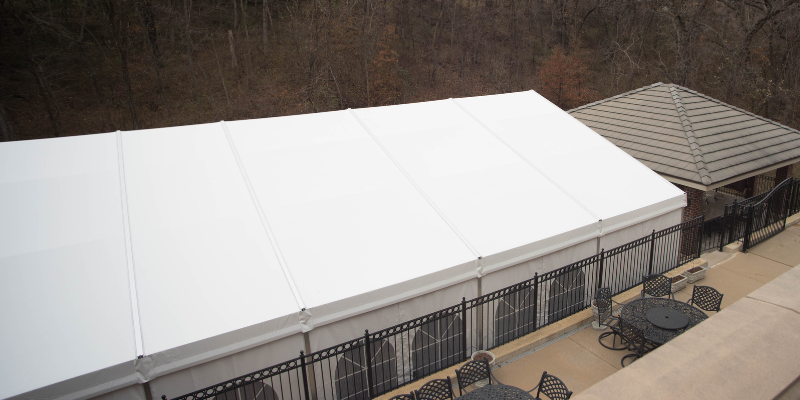As an event rental company or event planner, your collection of event tents is crucial to your business. Ensuring these tents are well-maintained is not only important for the appearance of your client’s events but also for the longevity of your equipment. Here are some expert tips for storing, cleaning, and conducting minor repairs on your event tents to keep them in top condition and extend their lifespan.
Storage
Proper storage is key to protecting your event tents during periods of non-use. Here are some storage tips to keep your premium tents safe and sound when not in use:
Invest in storage solutions: Consider investing in commercial-grade storage racks or shelving units to keep your event tents organized and off the ground. This can help mitigate any dust, direct, or pests that might find their way into your storage space.
Label and inventory: To streamline the retrieval process, label your tents clearly and keep an inventory of all your equipment to track usage and maintenance schedules.
Climate-controlled storage: If possible, store your tents in a temperature-controlled environment to prevent damage from extreme heat, cold, or humidity. Just because your event structures can withstand the changing weather, doesn’t mean they should have to when they’re being stored.
Protective covers: Use custom covers or tarps to shield your folded or rolled-up tents from dust and debris while in storage.
Powder coated and heat transfer frames: For powder coated and heat transfer frames, develop a packing solution that minimizes touch points between materials. Some clients will use scrap carpet pieces in the racking system to help protect the frames. Should damage occur, the powder coating and heat transfer frames can be easily touched up.
Cleaning
Maintaining a regular cleaning schedule for your event tents is essential to preserve their appearance and functionality. Consider these cleaning recommendations for your event tent structures:
Cleaning solutions: There are a number of cleaning solutions distributed by reputable suppliers. These solutions are formulated and tested to be safe for PVC materials as well as aluminum frames.
Keep the fabric off the ground: During setup and take down, its best if our fabric structures never touch asphalt, concrete, or natural surfaces. Utilize tarps and other materials to ensure your tent fabric stays away from these other surfaces.
Power washing: For larger tents, use a gentle power washer with a wide nozzle setting to remove dirt and buildup effectively without damaging the fabric. It can be imperative to first try any power-washing on a small portion of the tent material, to make sure that the full event structure can tolerate power-washing.
Drying time: Ensure your tents are completely dry before storing them to prevent mold and mildew growth. Consider using industrial-sized fans to expedite the drying process. If you do need to pack up while the tent structure is still wet, make sure you are able to dry it out completely once back in the warehouse or storage space.
Minor Repairs
Being proactive with minor repairs can prevent larger issues down the line and help prolong the lifespan of your event tents. Event rental companies and event planners can get the biggest return on investment with their event tents by repairing minor holes and tears before they become larger, unavoidable issues. Here are some repair tips to extend your tent lifespan:
Emergency repair kit: Equip your team with a comprehensive repair kit containing patch materials, seam sealers, replacement parts, and tools for quick fixes on the go. It may be beneficial to bring additional tent accessories that can mitigate further damage from occurring, if possible.
Regular inspections: Conduct regular inspections of your tents for signs of wear and tear, focusing on seams, zippers, and attachments that may need reinforcement or replacement. A fine line exists between the material being taut and not too loose or tight. Extend these regular inspections to your complete inventory of tent accessories, from glass doors to rain gutters.
Training and resources: Provide your set-up and tear-down staff with training on basic tent repairs and maintenance techniques to address minor issues promptly and effectively.
Document repairs: Keep detailed records of any repairs or modifications made to your event tents, including dates, descriptions, and photos, to track their condition over time. As event teams change over time, keeping these records can help alleviate any lingering questions about repairs or tent modifications.
Liri Tent: Your Top Provider for Event Tents
By following these suggestions for tent cleaning and repairs, as well as tent storage solutions event rental companies and planners alike can ensure that their event tents remain pristine, perform optimally at events, and have an extended lifespan. Maintaining your investment in quality equipment is key to delivering exceptional experiences for your clients and solidifying your reputation in the events industry.
If you’re interested in adding luxury event tents to your tent inventory or learning more about tent care best practices, contact Liri Tent today! Our professionals can help you find the perfect event structure for your needs and provide you with tips and tricks to keep your event tents lasting long.

